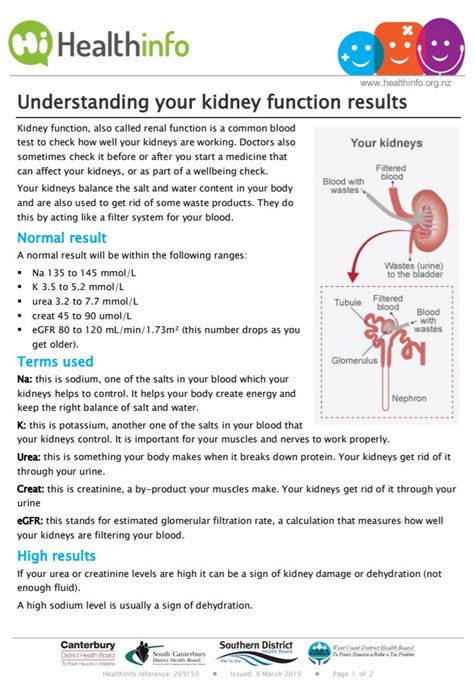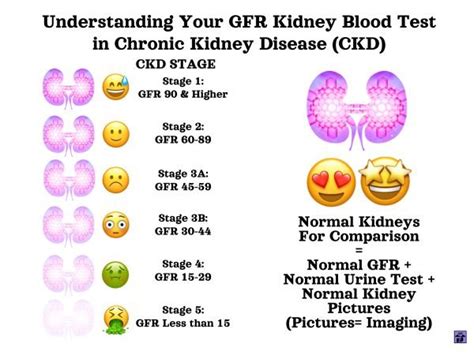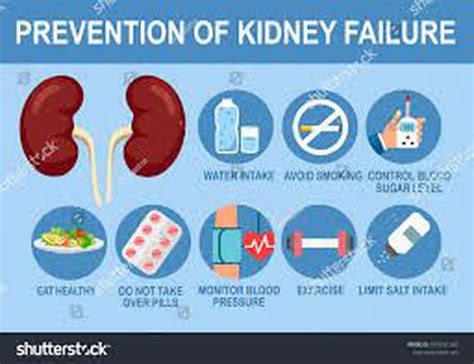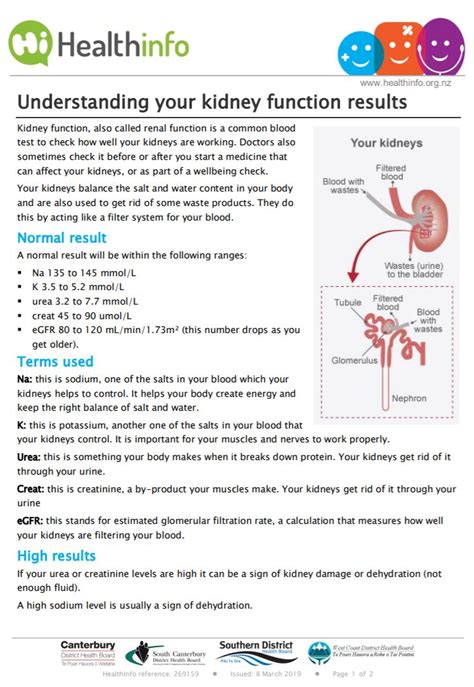Intro
Understand kidney function blood test results, including GFR, creatinine, and urea levels, to diagnose kidney disease, renal failure, and monitor treatment efficacy, ensuring optimal kidney health and function.
The importance of kidney function cannot be overstated, as these vital organs play a crucial role in filtering waste and excess fluids from the blood. When kidney function is impaired, it can lead to a range of serious health problems, including kidney disease, kidney failure, and even death. One of the most effective ways to monitor kidney function is through a blood test, which can provide valuable insights into the health of these vital organs. In this article, we will delve into the world of kidney function blood test results, exploring what they mean, how they are interpreted, and what steps can be taken to maintain healthy kidney function.
Kidney function blood tests are a common diagnostic tool used by healthcare professionals to assess the health of the kidneys. These tests typically measure the levels of waste products, such as creatinine and urea, in the blood, as well as the levels of electrolytes, such as potassium and sodium. By analyzing these test results, healthcare professionals can gain a better understanding of how well the kidneys are functioning and identify any potential problems. For example, elevated levels of creatinine in the blood can indicate impaired kidney function, while low levels of potassium can increase the risk of kidney stones.
The kidneys play a vital role in maintaining overall health, and kidney function blood tests are an essential tool in monitoring their health. By understanding what kidney function blood test results mean, individuals can take proactive steps to protect their kidney health and reduce the risk of kidney disease. This can include making lifestyle changes, such as following a healthy diet, staying hydrated, and managing underlying medical conditions. Additionally, kidney function blood tests can help healthcare professionals identify potential problems early on, allowing for prompt treatment and preventing long-term damage to the kidneys.
Kidney Function Blood Test Results: What Do They Mean?

Kidney function blood test results can be complex and may require interpretation by a healthcare professional. The test results typically include several key components, including creatinine levels, urea levels, and electrolyte levels. Creatinine is a waste product that is produced by the muscles and filtered out of the blood by the kidneys. Elevated creatinine levels can indicate impaired kidney function, while low levels can indicate healthy kidney function. Urea, on the other hand, is a waste product that is produced by the liver and filtered out of the blood by the kidneys. Elevated urea levels can also indicate impaired kidney function.
Understanding Creatinine Levels
Creatinine levels are an essential component of kidney function blood test results. Creatinine is a waste product that is produced by the muscles and filtered out of the blood by the kidneys. The normal range for creatinine levels varies depending on age, sex, and body size, but generally falls between 0.6 and 1.2 milligrams per deciliter (mg/dL) for adults. Elevated creatinine levels can indicate impaired kidney function, while low levels can indicate healthy kidney function.Interpreting Kidney Function Blood Test Results

Interpreting kidney function blood test results requires a comprehensive understanding of the test components and their normal ranges. Healthcare professionals use a combination of test results, medical history, and physical examination to diagnose and manage kidney disease. The following are some general guidelines for interpreting kidney function blood test results:
- Normal kidney function: Creatinine levels between 0.6 and 1.2 mg/dL, urea levels between 7 and 20 mg/dL, and electrolyte levels within normal ranges.
- Mild kidney impairment: Creatinine levels between 1.3 and 1.5 mg/dL, urea levels between 21 and 30 mg/dL, and electrolyte levels slightly elevated.
- Moderate kidney impairment: Creatinine levels between 1.6 and 2.0 mg/dL, urea levels between 31 and 40 mg/dL, and electrolyte levels moderately elevated.
- Severe kidney impairment: Creatinine levels above 2.0 mg/dL, urea levels above 40 mg/dL, and electrolyte levels significantly elevated.
Kidney Function Blood Test Results: What Do Abnormal Results Mean?
Abnormal kidney function blood test results can indicate a range of potential problems, from mild kidney impairment to severe kidney disease. The following are some possible causes of abnormal kidney function blood test results:- Kidney disease: Kidney disease, such as chronic kidney disease (CKD) or acute kidney injury (AKI), can cause abnormal kidney function blood test results.
- Diabetes: Diabetes is a common cause of kidney disease, and abnormal kidney function blood test results can indicate diabetic nephropathy.
- High blood pressure: Uncontrolled high blood pressure can cause kidney damage and abnormal kidney function blood test results.
- Kidney stones: Kidney stones can cause abnormal kidney function blood test results, particularly if they are large or obstructing the urinary tract.
Maintaining Healthy Kidney Function

Maintaining healthy kidney function is essential for overall health and well-being. The following are some tips for maintaining healthy kidney function:
- Stay hydrated: Drinking plenty of water can help flush out waste products and reduce the risk of kidney stones.
- Follow a healthy diet: Eating a balanced diet that is low in salt, sugar, and unhealthy fats can help maintain healthy kidney function.
- Manage underlying medical conditions: Managing underlying medical conditions, such as diabetes and high blood pressure, can help reduce the risk of kidney disease.
- Avoid smoking: Smoking can increase the risk of kidney disease and reduce kidney function.
- Limit NSAID use: Nonsteroidal anti-inflammatory drugs (NSAIDs) can increase the risk of kidney disease and reduce kidney function.
Kidney Function Blood Test Results: When to Seek Medical Attention
If kidney function blood test results are abnormal, it is essential to seek medical attention promptly. The following are some signs and symptoms that may indicate kidney disease or kidney failure:- Blood in the urine
- Protein in the urine
- Swelling in the feet, ankles, or hands
- Fatigue or weakness
- Nausea or vomiting
- Abdominal pain or discomfort
Kidney Disease Prevention and Management

Preventing and managing kidney disease requires a comprehensive approach that includes lifestyle changes, medical treatment, and regular monitoring. The following are some strategies for preventing and managing kidney disease:
- Lifestyle changes: Making lifestyle changes, such as following a healthy diet, staying hydrated, and managing underlying medical conditions, can help prevent and manage kidney disease.
- Medical treatment: Medical treatment, such as medication or dialysis, may be necessary to manage kidney disease and prevent progression to kidney failure.
- Regular monitoring: Regular monitoring of kidney function blood test results and other health parameters can help identify potential problems early on and prevent long-term damage to the kidneys.
Kidney Function Blood Test Results: The Role of Diet and Nutrition
Diet and nutrition play a critical role in maintaining healthy kidney function and preventing kidney disease. The following are some dietary tips for maintaining healthy kidney function:- Eat a balanced diet: Eating a balanced diet that is low in salt, sugar, and unhealthy fats can help maintain healthy kidney function.
- Stay hydrated: Drinking plenty of water can help flush out waste products and reduce the risk of kidney stones.
- Limit protein intake: Limiting protein intake can help reduce the risk of kidney disease and slow disease progression.
- Avoid foods high in phosphorus: Avoiding foods high in phosphorus, such as dairy products and processed meats, can help reduce the risk of kidney disease.
Kidney Function Blood Test Results: The Importance of Regular Monitoring

Regular monitoring of kidney function blood test results is essential for maintaining healthy kidney function and preventing kidney disease. The following are some reasons why regular monitoring is important:
- Early detection: Regular monitoring can help identify potential problems early on, allowing for prompt treatment and preventing long-term damage to the kidneys.
- Disease progression: Regular monitoring can help track disease progression and adjust treatment plans as needed.
- Treatment efficacy: Regular monitoring can help evaluate the effectiveness of treatment plans and make adjustments as needed.
Kidney Function Blood Test Results: Conclusion and Next Steps
In conclusion, kidney function blood test results are a valuable tool for monitoring kidney health and preventing kidney disease. By understanding what kidney function blood test results mean and taking proactive steps to maintain healthy kidney function, individuals can reduce the risk of kidney disease and promote overall health and well-being. If you have concerns about your kidney function or would like to learn more about kidney disease prevention and management, consult with a healthcare professional for personalized guidance and support.What do kidney function blood test results mean?
+Kidney function blood test results measure the levels of waste products, such as creatinine and urea, in the blood, as well as the levels of electrolytes, such as potassium and sodium. Abnormal results can indicate impaired kidney function or kidney disease.
How often should I get kidney function blood tests?
+The frequency of kidney function blood tests depends on individual risk factors and medical history. Generally, individuals with underlying medical conditions or a family history of kidney disease should get tested more frequently.
Can I prevent kidney disease through lifestyle changes?
+Yes, making lifestyle changes, such as following a healthy diet, staying hydrated, and managing underlying medical conditions, can help prevent kidney disease and promote healthy kidney function.
We hope this article has provided valuable insights into kidney function blood test results and the importance of maintaining healthy kidney function. If you have any questions or concerns, please do not hesitate to reach out to a healthcare professional for personalized guidance and support. Share this article with friends and family to help promote kidney health awareness and encourage others to take proactive steps to protect their kidney health.
